2018-04-02 Mon
■ #3262. 後期中英語の標準化における "intensive elaboration" [lme][standardisation][latin][french][register][terminology][lexicology][loan_word][lexical_stratification]
「#2742. Haugen の言語標準化の4段階」 ([2016-10-29-1]) や「#2745. Haugen の言語標準化の4段階 (2)」 ([2016-11-01-1]) で紹介した Haugen の言語標準化 (standardisation) のモデルでは,形式 (form) と機能 (function) の対置において標準化がとらえられている.それによると,標準化とは "maximal variation in function" かつ "minimal variation in form" に特徴づけられる現象である.前者は codification (of form),後者は elaboration (of function) に対応すると考えられる.
しかし,"elaboration" という用語は注意が必要である.Haugen が標準化の議論で意図しているのは,様々な使用域 (register) で広く用いることができるという意味での "elaboration of function" のことだが,一方 "elaboration of form" という別の過程も,後期中英語における標準化と深く関連するからだ.混乱を避けるために,Haugen が使った意味での "elaboration of function" を "extensive elaboration" と呼び,"elaboration of form" のほうを "intensive elaboration" と呼んでもいいだろう (Schaefer 209) .
では,"intensive elaboration" あるいは "elaboration of form" とは何を指すのか.Schaefer (209) によれば,この過程においては "the range of the native linguistic inventory is increased by new forms adding further 'variability and expressiveness'" だという.中英語の後半までは,書き言葉の標準語といえば,英語の何らかの方言ではなく,むしろラテン語やフランス語という外国語だった.後期にかけて英語が復権してくると,英語がそれらの外国語に代わって標準語の地位に就くことになったが,その際に先輩標準語たるラテン語やフランス語から大量の語彙を受け継いだ.英語は本来語彙も多く保ったままに,そこに上乗せして,フランス語の語彙とラテン語の語彙を取り入れ,全体として序列をなす三層構造の語彙を獲得するに至った(この事情については,「#334. 英語語彙の三層構造」 ([2010-03-27-1]) や「#2977. 連載第6回「なぜ英語語彙に3層構造があるのか? --- ルネサンス期のラテン語かぶれとインク壺語論争」」 ([2017-06-21-1]) の記事を参照).借用語彙が大量に入り込み,書き言葉上,英語の語彙が序列化され再編成されたとなれば,これは言語標準化を特徴づける "minimal variation in form" というよりは,むしろ "maximal variation in form" へ向かっているような印象すら与える.この種の variation あるいは variability の増加を指して,"intensive elaboration" あるいは "elaboration of form" と呼ぶのである.
つまり,言語標準化には形式上の変異が小さくなる側面もあれば,異なる次元で,形式上の変異が大きくなる側面もありうるということである.この一見矛盾するような標準化のあり方を,Schaefer (220) は次のようにまとめている.
While such standardizing developments reduced variation, the extensive elaboration to achieve a "maximal variation in function" demanded increased variation, or rather variability. This type of standardization, and hence norm-compliance, aimed at the discourse-traditional norms already available in the literary languages French and Latin. Late Middle English was thus re-established in writing with the help of both Latin and French norms rather than merely substituting for these literary languages.
・ Schaefer Ursula. "Standardization." Chapter 11 of The History of English. Vol. 3. Ed. Laurel J. Brinton and Alexander Bergs. Berlin/Boston: De Gruyter, 2017. 205--23.
2018-03-31 Sat
■ #3260. 古英語における標準化 [oe][standardisation][orthography][lexicology]
古英語について標準化 (standardisation) を論じる際に主たる話題となるのは,(1) 初期古英語の "Early West Saxon" あるいは "Alfredian Old English" の正書法,(2) 後期古英語の "Late West Saxon", "Ælfrician Old English" あるいは "Standard Old English" の正書法,(3) "Winchester vocabulary" の3点だろうか.そのほかにも,"Mercian literary language" なども標準化という項目のもとで扱い得る話題かもしれない.
これらの古英語の「標準語」は,「#2745. Haugen の言語標準化の4段階 (2)」 ([2016-11-01-1]) や「#3209. 言語標準化の7つの側面」 ([2018-02-08-1]) で紹介した Haugen や Milroy and Milroy の標準化の理論的な基準に照らしてみれば,あくまで限定的な意味での「標準語」にすぎないとはいえるだろう.例えば Late West Saxon が古英語の標準語(少なくとも正書法において)であるという捉え方が一般的になっているが,それは Haugen のいう Selection の段階を経た程度に過ぎず,Codification, Elaboration, Acceptance という側面についてはほぼ何も関わっていない.厳密にいうのであれば,「標準語」などではないということになる.Late West Saxon については,正書法ではなく,むしろ屈折形態論における標準(化)を論じるほうが適切ではないかという意見もある (Kornexl 231) .
しかし,英語史全体の流れのなかで標準化を考える上では,やはり古英語の状況も比較対象として押さえておくのがよい.例えば,初期古英語の Early West Saxon と後期古英語の Late West Saxon については,それぞれ正書法上の限定的な標準化を論じることができるが,両者の間には必ずしも通時的な連続性はないとされている点は重要である (Kornexl 230) .また,中英語後期から発達する標準語も,これらの古英語の標準語のいずれとも連続性がない.つまり,英語の標準化は,歴史上,独立して何度か生じている.
語彙に関する古英語の標準化の事例としては,"Winchester vocabulary" が挙げられる.10--11世紀に "Winchester group/circle" と名付けられた学派が Winchester に集って書いた文章のなかに,策定されたとおぼしき一定の語彙が確認される.その学派のなかで最も典型的な著者は Ælfric であり,彼のテキストにおいては "Winchester vocabulary" の採用率は98.3%にも上るという.この標準的語彙の起源がどこにあるのかについては議論があるが,ラテン語テキストからの古英語翻訳の際に訳語として定着したものが多いということが言われている.したがって,ある意味では外からの圧力による標準化の事例ということになろうか.
・ Kornexl, Lucia. "Standardization." Chapter 12 of The History of English. Vol. 2. Ed. Laurel J. Brinton and Alexander Bergs. Berlin/Boston: De Gruyter, 2017. 220--35.
2018-03-30 Fri
■ #3259. 17世紀に作られた動詞派生名詞群の呈する問題 (2) [synonym][loan_word][borrowing][renaissance][inkhorn_term][emode][lexicology][word_formation][suffix][affixation][neologism][derivation][statistics]
昨日の記事 ([2018-03-29-1]) の続編.昨日示した Bauer からの動詞派生名詞のリストでは,-ment や -ure の接尾辞の存在が目立っていた.17世紀の名詞を作る接尾辞にどのような種類のものがあり,それぞれがいくつの名詞を作っていたのだろうか.これについても,Bauer (185) が OED に基づいて統計をとっている.結果は以下の通り.
| Suffix | Number |
| -y | 2 |
| -ery | 8 |
| -ancy | 10 |
| -ency | 10 |
| -ence | 18 |
| -ion | 20 |
| -ance | 49 |
| -al | 56 |
| -ure | 96 |
| -ation | 190 |
| -ment | 258 |
トップ数種類の接尾辞が大半をカバーしていることから,頻度の高い「典型的な」接尾辞があることは確かにわかる.しかし,典型的な接尾辞が少数あるということで,問題が解決することにはならない.これらの典型的な接尾辞を含めた複数種類の接尾辞が,同一の基体に接続し得たということ,そして実際にそのように造語され併用されたという状況こそが,問題だったである.
昨日の記事で触れたように,Bauer はこの問題を新語のニーズに関わる複雑さに帰しているが,それと関連して,生産的な派生に対して非生産的な派生への需要も常に存在するものだという主張を展開している.
. . . there is a constant application of unproductive morphology in order to solve problems provided by productive morphology, so that the language is continually having new words added to it which are not the forms which would be the predicted ones, as well as a number of predicted forms. That is, the processes of history add irregularities (which are available to turn into regularities if enough of them are coined). History, rather than simplifying matters (or rather than merely simplifying matters), reflects a process of building in extra complications.
言語使用者の新語への要求は,必ずしも生産的な派生が与えてくれる手段とその結果だけでは満たされないほどに複雑で精妙なのだろう.そこで,あえて非生産的な派生の手段を用いて,不規則な派生語を作り出すこともあるのかもしれない.現代の歴史言語学者は,過去に生きた言語使用者の,そのような複雑で精妙な造語心理にどこまで迫れるのだろうか.困難ではあるがエキサイティングなテーマである.
・ Bauer, Laurie. "Competition in English Word Formation." Chapter 8 of The Handbook of the History of English. Ed. Ans van Kemenade and Bettelou Los. Malden, MA: Blackwell, 2006. 177--98.
2018-03-29 Thu
■ #3258. 17世紀に作られた動詞派生名詞群の呈する問題 (1) [synonym][lexical_blocking][loan_word][borrowing][renaissance][inkhorn_term][emode][lexicology][word_formation][suffix][affixation][neologism][derivation][cognate]
英国ルネサンス期の17世紀には,ラテン語やギリシア語を中心とする諸言語から大量の語彙が借用された.この経緯については,これまで「#478. 初期近代英語期に湯水のように借りられては捨てられたラテン語」 ([2010-08-18-1]),「#114. 初期近代英語の借用語の起源と割合」 ([2009-08-19-1]),「#1226. 近代英語期における語彙増加の年代別分布」 ([2012-09-04-1]) などの記事で様々な角度から取り上げてきた.この時代には,しばしば「同じ語」が異なった接尾辞を伴って誕生するという現象が見られた.例えば,すでに1586年に discovery が英語語彙に加えられていたところに,17世紀になって同義の discoverance や discoverment も現われ,短期間とはいえ競合・共存したのである(関連して,「#3157. 華麗なる splendid の同根類義語」 ([2017-12-18-1]) も参照).
以下は,Bauer (186) が OED から収集した,17世紀に初出する動詞派生名詞の組である.
| abutment | abuttal | |
| bequeathal | bequeathment | |
| bewitchery | bewitchment | |
| commitment | committal | committance |
| composal | compositure | |
| comprisal | comprisement | comprisure |
| concumbence | concumbency | |
| condolement | condolence | |
| conducence | conducency | |
| contrival | contrivance | |
| depositation | depositure | |
| deprival | deprivement | |
| desistance | desistency | |
| discoverance | discoverment | |
| disfiguration | disfigurement | |
| disproval | disprovement | |
| disquietal | disquietment | |
| dissentation | dissentment | |
| disseveration | disseverment | |
| encompassment | encompassure | |
| engraftment | engrafture | |
| exhaustment | exhausture | |
| exposal | exposement | exposure |
| expugnance | expugnancy | |
| expulsation | expulsure | |
| extendment | extendure | |
| impartment | imparture | |
| imposal | imposement | imposure |
| insistence | insisture | |
| interposal | interposure | |
| pretendence | pretendment | |
| promotement | promoval | |
| proposal | proposure | |
| redamancy | redamation | |
| renewal | renewance | |
| reposance | reposure | |
| reserval | reservancy | |
| resistal | resistment | |
| retrieval | retrievement | |
| returnal | returnment | |
| securance | securement | |
| subdual | subduement | |
| supportment | supporture | |
| surchargement | surchargure |
これらの語のなかには,現在でも標準的なものもあれば,すでに廃語となっているものもある.短期間しか用いられなかったものもあれば,広く受け入れられたものもある.17世紀より前か後に作られた同義の派生名詞と競合したものもあれば,そうでないものもある.この時代の後,現代に至るまでに,これらの2重語や3重語の並存状況が整理されていったケースもあれば,そうでないケースもある.整理のされ方が lexical_blocking の原理により説明できるものもあれば,そうでないものもある.つまり,これらの組について一般化して言えることはあまりないのである.
17世紀に限らないとはいえ,とりわけこの世紀に,互いに意味を違えない派生名詞が複数作られ,競合・共存したという事実は何を物語るのだろうか.ラテン語やギリシア語から湯水のように語を借用した結果ともいえるし,それらから抽出した名詞派生接尾辞を利用して無方針に様々な派生名詞を造語していった結果ともいえる.しかし,Bauer (197) は社会言語学的な観点から,次のように示唆している.
Individual ad hoc decisions on relevant forms may or may not be picked up widely in the community. . . . [I]t is clear from the history which the OED presents that the need of the individual for a particular word is not always matched by the need of the community for the same word, with the result that multiple coinages are possible.
いずれにせよ,この歴史的事情が,現代英語の動詞派生名詞の形態に少なからぬ不統一と混乱をもたらし続けていることは事実である.今後,整理されてゆくとしても,おそらくそれには数世紀という長い時間がかかることだろう.
・ Bauer, Laurie. "Competition in English Word Formation." Chapter 8 of The Handbook of the History of English. Ed. Ans van Kemenade and Bettelou Los. Malden, MA: Blackwell, 2006. 177--98.
2018-02-23 Fri
■ #3224. Thomas Harman, A Caveat or Warening for Common Cursetors (1567) [dictionary][slang][lexicology][lexicography][renaissance][register]
昨日の記事「#3223. George Andrews, A Dictionary of the Slang and Cant language (1809)」 ([2018-02-22-1]) で,英語史上初の俗語・隠語の用語集,Thomas Harman の A Caveat or Warening for Common Cursetors (1567) に言及した.英語史上初の英英辞書,Robert Cawdrey の A Table Alphabeticall に30年以上も先駆けて出版されたというのは驚くべきことに思われるかもしれない.普通の英英辞書よりも,裏世界の用語集のほうが早いというのは,何だかおもしろい.
しかし,ルネサンス期以前のイングランドにおける辞書編纂の経緯を振り返ってみると,むしろこの流れは自然である.まず,ある言語について最初に作られる辞書・用語集は,ほぼ間違いなく外国語辞書,つまり bilingual dictionaries/glossaries である.実際,羅英辞書,仏英辞書,伊英辞書などが英語史上,先に現われている.このことは,考えてみれば当然である.何といっても,理解できない言語の単語を母語の単語で教えてくれるのが,辞書の第1の役割である.すでによく知っている母語の単語を母語で言い換えたり説明したりする monolingual dictionaries/glossaries は,現代でこそ価値あるものと了解されているが,近代初期にあっては,いまだその意義は人々にピンとこなかったろう.
そして,外国語辞書に準ずるものとして,次に裏世界の俗語・隠語 (canting language) の用語集が編まれることになった.善良な一般市民にとって,canting language は外国語も同然である.したがって,A Caviat もある種の bilingual glossary だったと言ってよいのである.
続けて,1604年に英語史上初の「普通の英英辞書」と先ほど言及した A Table Alphabeticall が出版されたが,実際には「普通」の英単語を集めたものではなく,主としてラテン借用語などからなる「難語」を集めたものだった.これも見方によっては bilingual dictionary とも言えるものである.その後,17世紀を通じて英語に関する辞書がたくさん出版されたが,いずれも難語辞書であり,bilingual dictionaries の域を出てはいなかったとも考えられる(cf. 「#609. 難語辞書の17世紀」 ([2010-12-27-1])).
上記の経緯を勘案すると,いたずらぽい見方をして,英語史上初の英英辞書・用語集は A Caviat であると宣言することもできるかもしれないのだ.この点について,Blank (231) を引用したい.
In fact the original English-English dictionaries, long preceding those produced in the seventeenth century, were glossaries of the canting language. As Thomas Harman and his followers often noted, cant was otherwise known in the period as 'pedlar's French', a term which again reinforced notions of its 'foreign' nature. Harman's popular pamphlet A Caveat or Warening for Common Cursetors (1567) describes the underworld language as a 'leud, lousey language of these lewtering Luskes and lasy Lorrels . . . a vnknowen toung onely, but to these bold, beastly, bawdy Beggers, and vaine Vacabondes'. As a measure of social precaution, he included a glossary intended to expose the 'vnknowen toung', thereby translating the 'leud, lousey' language into 'common' English:
Nab, a pratling chete, quaromes, a head. a tounge. a body. Nabchet, Crashing chetes, prat, a hat or cap. teeth. a buttocke.
and so on through a list that includes 120 terms.
・ Blank, Paula. "The Babel of Renaissance English." Chapter 8 of The Oxford History of English. Ed. Lynda Mugglestone. Oxford: OUP, 2006. 212--39.
2018-02-22 Thu
■ #3223. George Andrews, A Dictionary of the Slang and Cant language (1809) [lexicology][lexicography][slang][register]
19世紀前半には数十の俗語辞書が編纂されたが,その目的の1つに,ハイカルチャーな語彙しか収録しなかった Johnson の辞書を補完するという狙いがあったろう.しかし,今回取り上げる George Andrews による A Dictionary of the Slang and Cant language (1809) には,もっと「啓蒙的」な役割があった.それは,泥棒の俗語・隠語を世に広く知らしめることにより,犯罪抑止を狙うというものだった.ある種の社会正義を目指した書といってよいかもしれない.Crystal (68) によると,この辞書の売り文句として,次のような宣伝が書かれていたという.
One great misfortune to which the Public are liable, is, that Thieves have a Language of their own; by which means they associate together in the streets, without fear of being over-heard or understood.
The principal end I had in view in publishing this DICTIONARY, was, to expose the Cant Terms of their Language, in order to the more easy detection of their crimes; and I flatter myself, by the perusal of this Work, the Public will become acquainted with their mysterious Phrases; and be better able to frustrate their designs.
Crystal (68) に再掲されている,いくつかの見出し語と定義を以下に挙げよう.19世紀初頭の泥棒の隠語だが,おそらく現在の泥棒には通じないのだろうなあ・・・.
| Adam Tylers | pickpockets' accomplices |
| badgers | hawkers |
| bullies, bully-huffs, bully-rooks | hired ruffians |
| bloods | roisterers |
| buffers | horse killers (for the skins) |
| beau-traps | well-dressed sharpers |
| cloak-twitchers | cloak-snatchers (from off people's shoulders) |
| clapperdogeons (also spelled clapperdudgeon) | beggars |
| coiners | counterfeiters |
| cadgers | beggars |
| duffers | hawkers |
| divers | pickpockets |
| dragsmen | vehicle thieves |
| filers | coin-filers |
| fencers | receivers of stolen goods |
| footpads | highwaymen who rob on foot |
| gammoners | pickpockets' accomplices |
| ginglers (also jinglers) | horse-dealers |
| kencrackers | housebreakers |
| knackers | tricksters |
| lully-priggers | linen-thieves |
| millers | housebreakers |
| priggers | thieves |
| rum-padders | highwaymen |
| strollers | pedlars |
| sweeteners | cheats, decoys |
| spicers | footpads |
| smashers | counterfeiters |
| swadlers (also swadders) | pedlars |
| whidlers (also whiddlers) | informers |
| water-pads | robbers of ships |
なお,英語史上の俗語・隠語辞書の走りは,1567年の Thomas Harman による用語集 A Caveat or Warening for Common Cursetors とされる.通常の英語辞書の嚆矢が Robert Cawdrey による1604年の「#603. 最初の英英辞書 A Table Alphabeticall (1)」 ([2010-12-21-1]) であることを考えると,辞書編纂業においても暗黒世界は先進的(?)だったのかと感じ入る次第である.
slang, cant, argot, jargon などの用語については「#2410. slang, cant, argot, jargon, antilanguage」 ([2015-12-02-1]) を参照.また,隠語の性質については「#2166. argot (隠語)の他律性」 ([2015-04-02-1]),「#3076. 隠語,タブー,暗号」 ([2017-09-28-1]) もどうぞ.
・ Crystal, David. Evolving English: One Language, Many Voices. London: The British Library, 2010.
2018-02-16 Fri
■ #3217. ドーキンスと言語変化論 (3) [evolution][biology][language_change][semantic_change][bleaching][meme][lexicology]
この2日間の記事 ([2018-02-14-1], [2018-02-15-1]) に続き,ドーキンスの『盲目の時計職人』より,生物進化と言語変化の類似点や相違点について考える.同著には,時間とともに強意語から強意が失われていき,それを埋め合わせる新たな強意語が生まれる現象,すなわち「強意逓減の法則」と呼ぶべき話題を取りあげている箇所がある (349--50) .「花形役者」を意味する英単語 star にまつわる強意逓減に触れている.
〔言語には〕純粋に抽象的で価値観に縛られない意味あいで前進的な,進化のような傾向を探り当てることができる.そして,意味のエスカレーションというかたちで(あるいは別の角度からそれを見れば,退化ということになる)正のフィードバックの証拠が見いだされさえするだろう.たとえば,「スター」という単語は,まったく類まれな名声を得た映画俳優を意味するものとして使われていた.それからその単語は,ある映画で主要登場人物の一人を演じるくいらいの普通の俳優を意味するように退化した.したがって,類まれな名声というもとの意味を取り戻すために,その単語は「スーパースター」にエスカレートしなければならなかった.そのうち映画スタジオの宣伝が「スーパースター」という単語をみんなの聞いたこともないような俳優にまで使いだしたので,「メガスター」へのさらなるエスカレーションがあった.さていまでは,多くの売出し中の「メガスター」がいるが,少なくとも私がこれまで聞いたこともない人物なので,たぶんそろそろ次のエスカレーションがあるだろう.われわれはもうじき「ハイパースター」の噂を聞くことになるのだろうか? それと似たような正のフィードバックは,「シェフ」という単語の価値をおとしめてしまった.むろん,この単語はフランス語のシェフ・ド・キュイジーヌから来ており,厨房のチーフあるいは長を意味している.これはオックスフォード辞典に載っている意味である.つまり定義上は厨房あたり一人のシェフしかいないはずだ.ところが,おそらく対面を保つためだろう,通常の(男の)コックが,いやかけだしのハンバーガー番でさえもが,自分たちのことを「シェフ」と呼び出した.その結果,いまでは「シェフ長」なる同義反復的な言いまわしがしばしば聞かれるようになっている.
ドーキンスは,ここで「スター」や「シェフ」のもともとの意味をミーム (meme) としてとらえているのかもしれない(関連して,「#3188. ミームとしての言語 (1)」 ([2018-01-18-1]),「#3189. ミームとしての言語 (2)」 ([2018-01-19-1])).いずれにせよ,変化の方向性に価値観を含めないという点で,ドーキンスは徹頭徹尾ダーウィニストである.
強意の逓減に関する話題としては,「#992. 強意語と「限界効用逓減の法則」」 ([2012-01-14-1]) や「#1219. 強意語はなぜ種類が豊富か」 ([2012-08-28-1]),「#2190. 原義の弱まった強意語」 ([2015-04-26-1]) などを参照されたい.
・ ドーキンス,リチャード(著),中嶋 康裕・遠藤 彰・遠藤 知二・疋田 努(訳),日高 敏隆(監修) 『盲目の時計職人 自然淘汰は偶然か?』 早川書房,2004年.
2018-01-10 Wed
■ #3180. 徐々に高頻度語の仲間入りを果たしてきたフランス・ラテン借用語 [french][latin][loan_word][borrowing][frequency][statistics][lexicology][hc][bnc]
英語史では,中英語から初期近代英語にかけて,フランス語とラテン語から大量の語彙借用がなされた.それらのうち現在常用されるものについては,おそらく借用時点からスタートして時間とともに使用頻度が増してきたものと想像される.というのは,借用された当初から高頻度で用いられたとは考えにくく,徐々に英語に同化し,日常化してきたととらえるのが自然だからだ.
この仮説を実証するのにいくつかの方法がありそうだが,Durkin があるやり方で調査を行なっている.中英語,初期近代英語,現代英語のそれぞれにおいてコーパスに基づく最高頻度語リストを作り,そのなかにフランス・ラテン借用語がどのくらいの割合で含まれているかを調べ,その割合の通時的推移を比較するという手法だ.古い時代のコーパスでは綴字の変異という問題が関わるため,厳密に調査しようとすれば単純にはいかないが,Durkin はとりあえずの便法として,中英語と初期近代英語については Helsinki Corpus の 1150--1500年と1500--1710年のセクションを用いて,現代英語については BNC を用いて異綴字ベースで調査した.それぞれ頻度ランキングにして900--1000位ほどまでの単語(綴字)リストを作り,そのなかでフランス・ラテン語借用語が占める割合をはじき出した.
結果は,中英語セクションでは7%ほどだったものが,初期近代英語セクションでは19%まで上昇し,さらに現代英語セクションでは38%までに至っている.粗い調査であることは認めつつも,フランス・ラテン借用語で現在頻用されているものの多くについては,歴史のなかで徐々に頻度を上げてきた結果として,現在の日常的な性格を示すことがよくわかった.
さらにおもしろいことに,初期近代英語のセクション(1500--1710年)に関する数値について,高頻度語リストに含まれるフランス・ラテン借用語のすべてが1500年より前に借用されたものであり,しかもその2/3ほどは確実にフランス借用語であるという事実が確認される (Durkin 338--39) .
また,中英語と初期近代英語の高頻度語リストに含まれるフランス・ラテン借用語の多くが,現代英語の高頻度語リストにも再現されている事実にも触れておこう.古い2期には現われるが現代期からは漏れている語群を眺めると,なんとも時代の変化を感じさせてくれる.例えば,honour, justice, manner, noble, parliament, pray, prince, realm, religion, supper, treason, usury, virtue である (Durkin 340) .
時代によって最頻語リストやキーワードが異なることは当然といえば当然だが,歴史英語コーパスを用いて様々な時代を比較してみるとおもしろそうだ.例えば,初期近代英語コーパスに基づくキーワード・リストについて「#2332. EEBO のキーワードを抽出」 ([2015-09-15-1]) を参照.また,頻度と歴史の問題については「#1243. 語の頻度を考慮する通時的研究のために」 ([2012-09-21-1]) も参照されたい.
・ Durkin, Philip. Borrowed Words: A History of Loanwords in English. Oxford: OUP, 2014.
2018-01-09 Tue
■ #3179. 「新古典主義的複合語」か「英製羅語」か [neo-latin][latin][greek][word_formation][lexicology][loan_word][compounding][derivation][lmode][scientific_english][scientific_name][neologism][waseieigo][terminology][register]
新古典主義的複合語 (neoclassical compounds) とは,aerobiosis, biomorphism, cryogen, nematocide, ophthalmopathy, plasmocyte, proctoscope, rheophyte, technocracy のような語(しばしば科学用語)を指す.Durkin (346--37) によれば,この類いの語彙は早くは1600年前後から確認され,例えば polycracy (1581), pantometer (1597), multinomial (1608) がみられる.しかし,爆発的に量産されるようになったのは,科学が急速に発展した後期近代英語期,とりわけ19世紀になってからのことである(「#616. 近代英語期の科学語彙の爆発」 ([2011-01-03-1]),「#3013. 19世紀に非難された新古典主義的複合語」 ([2017-07-27-1]),「#3014. 英語史におけるギリシア語の真の存在感は19世紀から」 ([2017-07-28-1]),「#3166. 英製希羅語としての科学用語」 ([2017-12-27-1]) を参照).
新古典主義的複合語について強調しておくべきは,それが借用語ではなく,あくまで英語(を始めとするヨーロッパの諸言語)において形成された語であるという点だ.確かにラテン語やギリシア語などの古典語をモデルとしてはいるが,決してそこから借用されたわけではない.その意味では英単語ぽい体裁をしていながらも英単語ではない「和製英語」と比較することができる.新古典主義的複合語の舞台は英語であるから,つまり「英製羅語」といってよい.しかし,英製羅語と和製英語とのきわだった相違点は,前者が主として国際的で科学的な文脈で用いられるが,後者はそうではないという事実にある.すなわち,両者のあいだには使用域において著しい偏向がみられる.Durkin は,新古典主義的複合語について次のように述べている.
. . . these formations typically belong to the international language of science and move freely, often with little or no morphological adaptation, between English, French, German, and other languages of scientific discourse. They are often treated in very different ways in different traditions of lexicography and lexicology; however, those terms that are coined in modern vernacular languages are certainly not loanwords from Latin or Greek, even though they may be formed from elements that originated in such loanwords. (347)
. . . Latin words and word elements have become ubiquitous in modern technical discourse, but frequently in new compound or derivative formations or with new meanings that have seldom if ever been employed in contextual use in actual Latin sentences. (349)
これらの造語を指して「新古典主義的複合語」と呼ぶか「英製羅語」と呼ぶかは,たいした問題ではない.しかし,和製英語の場合には「英語主義的複合語」と呼ばないのはなぜだろうか.この違いは何に起因するのだろうか.
・ Durkin, Philip. Borrowed Words: A History of Loanwords in English. Oxford: OUP, 2014.
2018-01-04 Thu
■ #3174. 高頻度語はスペリングが短い (2) [frequency][spelling][orthography][zipfs_law][statistics][lexicology][corpus]
昨日の記事 ([2018-01-03-1]) と同じ頻度とスペリングの長さに関するデータを,もう少し分析してみた.以下は,頻度ランキングのトップ100語,200語,500語,1000語,2000語,5000語,10000語,20000語,50000語について,それぞれ最低値,第1四分位数,中央値,平均値,第3四分位数,最大値を示した表である.英語の正書法を論じる上での基礎データとしてどうぞ.
| Min. | 1st Qu. | Median | Mean | 3rd Qu. | Max. | |
|---|---|---|---|---|---|---|
| Top_100 | 1.0 | 2.0 | 3.0 | 3.1 | 4.0 | 5.0 |
| Top_200 | 1.00 | 3.00 | 4.00 | 3.77 | 4.00 | 10.00 |
| Top_500 | 1.000 | 4.000 | 4.000 | 4.498 | 5.000 | 10.000 |
| Top_1K | 1.000 | 4.000 | 5.000 | 4.968 | 6.000 | 15.000 |
| Top_2K | 1.000 | 4.000 | 5.000 | 5.406 | 7.000 | 15.000 |
| Top_5K | 1.000 | 5.000 | 6.000 | 6.014 | 7.000 | 16.000 |
| Top_10K | 1.000 | 5.000 | 6.000 | 6.488 | 8.000 | 16.000 |
| Top_20K | 1.000 | 5.000 | 7.000 | 6.954 | 8.000 | 17.000 |
| Top_50K | 1.000 | 6.000 | 7.000 | 7.622 | 9.000 | 20.000 |
これをもとに視覚化したのが,以下の箱ひげ図.
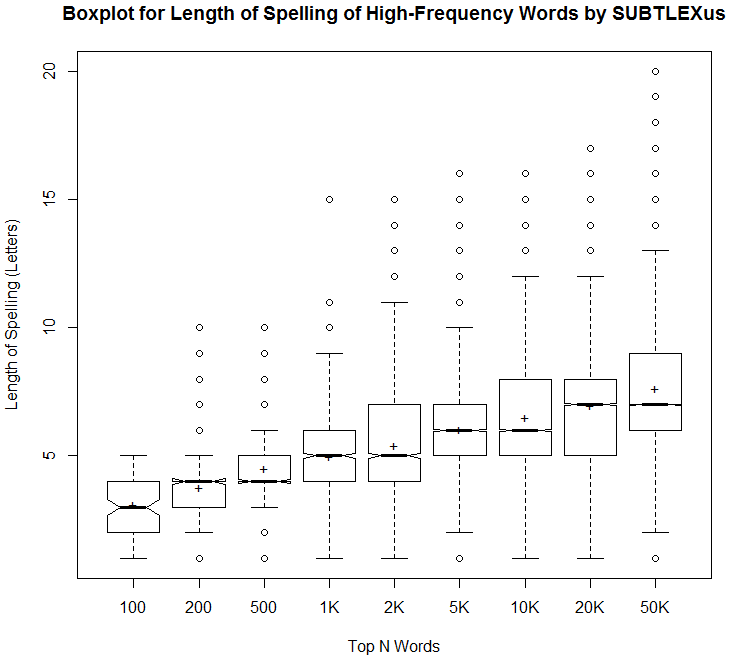
当然予想されたことだが,語数が増えるにしたがってスペリングの平均の長さは徐々に大きくなっていき,バラツキも広がっていく.しかし,トップ数万語でみても平均して7文字程度となっており,さほど長くないのだなという印象を受けた.
[ 固定リンク | 印刷用ページ ]
2018-01-03 Wed
■ #3173. 高頻度語はスペリングが短い (1) [frequency][spelling][orthography][zipfs_law][statistics][lexicology][corpus][three-letter_rule]
標題は特に目新しい指摘ではなく,英語を読み書きする者には直感されていることだと思われる.「#1091. 言語の余剰性,頻度,費用」 ([2012-04-22-1]) や「#1102. Zipf's law と語の新陳代謝」 ([2012-05-03-1]) でも指摘したように,よく読み書きする単語のスペリングは短いほうが効率がよいと考えられるからだ.逆に,滅多に読み書きしない単語であれば少々長くても我慢できる.単語のスペリングに限らず,単語の音形についても同様の原理が作用していると思われる.
また,英語の正書法には内容語は3文字以上で綴られなければならないという「#2235. 3文字規則」 ([2015-06-10-1]) がある.これは機能語という頻度のきわめて高い語類については適用されない.したがって,この規則は上記の効率の問題とも関わる実用的な側面をもつといえる.
高頻度語であればあるほど,そのスペリングが平均的に短いことを示す方法の1つに,頻度ランキングのトップ100語,1000語,10000語などのリストに基づき,文字数別に単語を数え上げるというやり方がある.「#2096. SUBTLEX-US Word Frequency List」 ([2015-01-22-1]) から引き出した頻度ランキングを利用して,トップ100語,200語,500語,1000語,2000語,5000語,10000語,20000語,50000語について調査した.トップ100語のリストについては先の記事でリストを掲載している通りであり,なかには s, ll などコーパスの仕様に由来するとおぼしき怪しい「語」もあるが,結果の大勢には影響を及ぼさないだろう.
以下にグラフで整理した通り,結果は明白である(数値データはソースHTMLを参照).トップ100語の超高頻度語群では62.00%までが3文字以下のスペリングである.3文字以下の割合(下から3つ分のオレンジの帯まで)ということで比べていくと,トップ200語から50000語の調査結果まで,順に41.50%, 24.60%, 17.00%, 12.65%, 8.06%, 6.01%, 4.55%, 3.20%と目減りしていく.
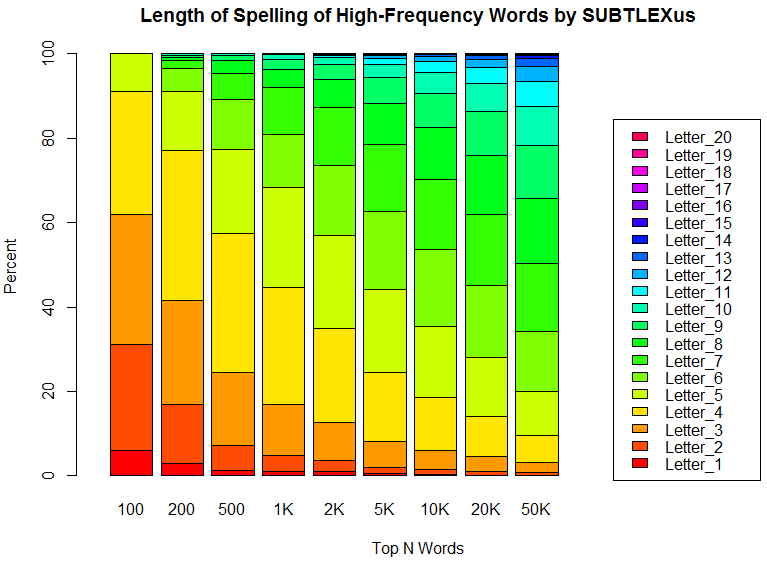
2017-12-31 Sun
■ #3170. 現代日本語の語種分布 (2) [japanese][lexicology][statistics][etymology][loan_word][lexical_stratification]
「#1645. 現代日本語の語種分布」 ([2013-10-28-1]) の記事で,標題について明治から昭和にかけて出版された国語辞典に基づく数値を示した.今回は平成からの数値を示そう.沖森ほか (71) に掲載されている,『新選国語辞典 第八版』(小学館,2002年)に基づいた語種分布である.
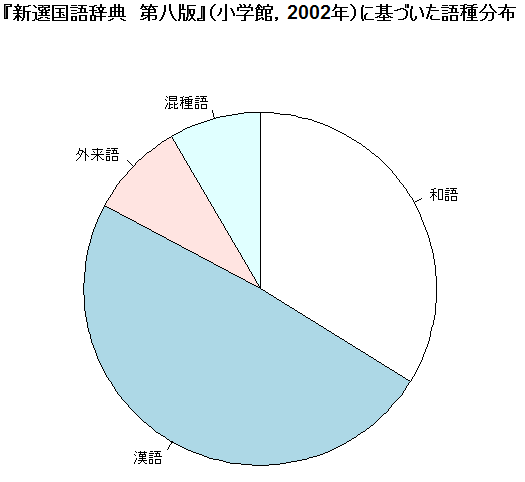
|
|
先の記事 ([2013-10-28-1]) で参照した,国立国語研究所『語彙の研究と教育(上)』(大蔵省印刷局,1984年)の雑誌90種に基づく異なり語数と延べ語数の統計も,改めて円グラフにして示そう(こちらも沖森ほか (79) 経由で).
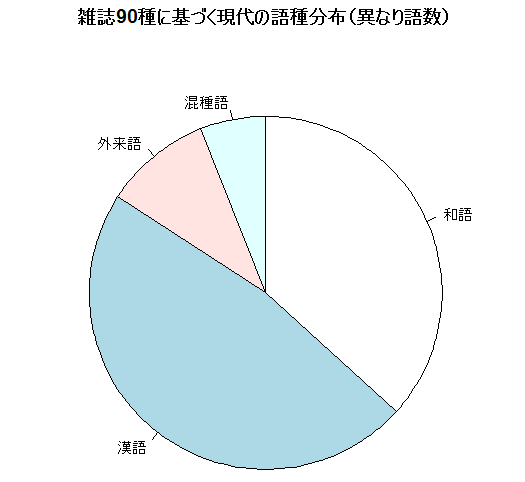
|
|
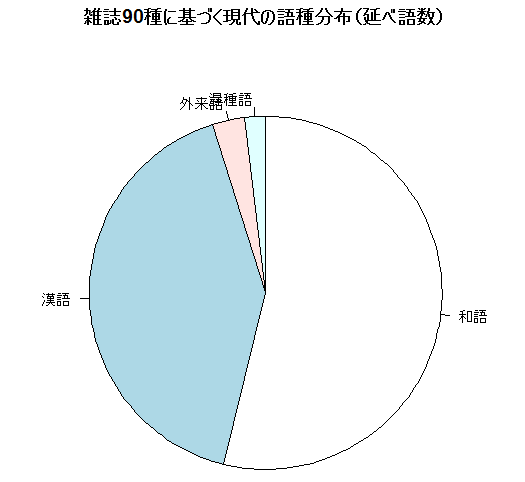
|
|
・ 沖森 卓也,木村 義之,陳 力衛,山本 真吾 『図解日本語』 三省堂,2006年.
[ 固定リンク | 印刷用ページ ]
2017-12-27 Wed
■ #3166. 英製希羅語としての科学用語 [waseieigo][latin][greek][scientific_name][compounding][compound][lmode][neo-latin][combining_form][neologism][lexicology][word_formation]
昨日の記事「#3165. 英製羅語としての conspicuous と external」 ([2017-12-26-1]) と関連して,再び「英製羅語」の周辺の話題.後期近代英語期には,科学の発展に伴いおびただしい科学用語が生まれたが,そのほとんどがギリシア語やラテン語に由来する要素 (combining_form) を利用した合成 (compounding) による造語である(「#552. combining form」 ([2010-10-31-1]),「#1694. 科学語彙においてギリシア語要素が繁栄した理由」 ([2013-12-16-1]),「#3013. 19世紀に非難された新古典主義的複合語」 ([2017-07-27-1]) を参照).
Kay and Allan (20--21) が,次のようにコメントしている.
While borrowing continues to reflect contact with other cultures, many scientific words are not strictly speaking loanwords. Rather, they are constructed from roots adopted from the classical languages. This has the advantage of a degree of semantic transparency: if you know that tele, graph and phone come from Greek roots meaning respectively 'afar', 'writing' and 'sound', and vision from a Latin root meaning 'see, look', you can begin to understand telegraph, telephone and television. You can also coin other words using similar patterns, and possibly elements from other sources, as in telebanking.
"neo-Hellenic compounds" や "neo-Latin compounds" とも呼ばれる上記のような語彙は,ある意味ではラテン語やギリシア語からの借用語ともみなしうるかもしれないが,より適切に「英製希語」あるいは「英製羅語」とみなすのがよいのではないか.ただし,いくつかの単語が単発で造語されたわけではなく,造語に体系的に利用された方法であるから「パターン化された英製希羅語」と呼ぶのがさらに適切かもしれない.
・ Kay, Christian and Kathryn Allan. English Historical Semantics. Edinburgh: Edinburgh UP, 2015.
2017-12-26 Tue
■ #3165. 英製羅語としての conspicuous と external [waseieigo][latin][borrowing][loan_word][derivation][etymology][suffix][adjective][emode][neologism][lexicology][word_formation][shakespeare]
標題と関連する話題は,「#1493. 和製英語ならぬ英製羅語」 ([2013-05-29-1]),「#1927. 英製仏語」 ([2014-08-06-1]),「#2979. Chibanian はラテン語?」 ([2017-06-23-1]) や,waseieigo の各記事で取り上げてきた.
Baugh and Cable (222) で,初期近代期に英語がラテン単語を取り込む際に施した適応 (adaptation) が論じられているが,次のような1文があった.
. . . the Latin ending -us in adjectives was changed to -ous (conspicu-us > conspicuous) or was replaced by -al as in external (L. externus).
これらの英単語は,ある意味では借用された語ともいえるが,ある意味では英語が自ら形成した語ともいえる.「英製羅語」と呼ぶのがふさわしい例ではないだろうか.
OED によれば,conspicuous は,ラテン語 conspicuus に基づき,英語側でやはりラテン語由来の形容詞を作る接尾辞 -ous を付すことによって新たに形成した語である.16世紀半ばに初出している.
1545 T. Raynald tr. E. Roesslin Byrth of Mankynde Hh vij These vaynes doo appeare more conspicuous and notable to the eyes.
実はこの接尾辞を基体(主としてラテン語由来だが,その他の言語の場合もある)に付加して自由に新たな形容詞を作るパターンはロマンス諸語に広く見られたもので,フランス語で -eus を付したものが,14--15世紀を中心として英語にも -ous の形で大量に入ってきた.つまり,まずもって仏製羅語というべきものが作られ,それが英語にも流れ込んできたというわけだ.例として,dangerous, orgulous, adventurous, courageous, grievous, hideous, joyous, riotous, melodious, pompous, rageous, advantageous, gelatinous などが挙げられる(OED の -ous, suffix より).
また,英語でもフランス語に習う形でこのパターンを積極的に利用し,自前で conspicuous のような英製羅語を作るようになってきた.同種の例として,guilous, noyous, beauteous, slumberous, timeous, tyrannous, blusterous, burdenous, murderous, poisonous, thunderous, adiaphorous, leguminous, delirious, felicitous, complicitous, glamorous, pulchritudinous, serendipitous などがある(OED の -ous, suffix より).
標題のもう1つの単語 external も conspicuous とよく似たパターンを示す.この単語は,ラテン語 externus に基づき,英語側でラテン語由来の形容詞を作る接尾辞 -al を付すことによって形成した英製羅語である.初出は Shakespeare.
a1616 Shakespeare Henry VI, Pt. 1 (1623) v. vii. 3 Her vertues graced with externall gifts.
a1616 Shakespeare Antony & Cleopatra (1623) v. ii. 340 If they had swallow'd poyson, 'twould appeare By externall swelling.
反意語の internal も同様の事情かと思いきや,こちらは一応のところ post-classical Latin として internalis が確認されるという.しかし,この語のラテン語としての使用も "14th cent. in a British source" ということなので,やはり英製の匂いはぷんぷんする.英語での初例は,15世紀の Polychronicon.
?a1475 (?a1425) tr. R. Higden Polychron. (Harl. 2261) (1865) I. 53 The begynnenge of the grete see is..at the pyllers of Hercules..; after that hit is diffusede in to sees internalle [a1387 J. Trevisa tr. þe ynnere sees; L. maria interna].
「○製△語」は決して珍しくない.
・ Baugh, Albert C. and Thomas Cable. A History of the English Language. 6th ed. London: Routledge, 2013.
2017-12-18 Mon
■ #3157. 華麗なる splendid の同根類義語 [cognate][synonym][lexicology][inkhorn_term][emode][borrowing][loan_word][renaissance][thesaurus][htoed]
「#576. inkhorn term と英語辞書」 ([2010-11-24-1]) の記事で,ルネサンス期のラテン語かぶれの華美を代表する単語の1つとして splendidious を挙げた.この語は現在では廃用となっているが,その意味は現代でも普通に用いられる splendid と同じ「華麗な,豪華な」である.前者はルネサンス華やかなりし15世紀から用いられており,後者も単語としては17世紀前半には初出している(ただし,語義によって初出年代が異なる).この15--17世紀には,語根も意味も同じくする splendid 系の単語がいくつも現われては消えていったのである.HTOED より splendid の項を覗いてみると,次のようにある.
02.04.05.03 (adj.) Splendid
þurhbeorht OE ・ geatolic OE ・ torht OE ・ torhtlic OE ・ wrætlic OE ・ orgulous/orgillous a1400 ・ splendidious 1432/50--1653 ・ splendiferous c1460--1546 ・ splendent 1509-- ・ splendant 1590-- ・ splendorous 1591-- ・ splendidous 1605--1640 ・ transplendent 1622; 1854 ・ florid 1642--1725 ・ splendious 1654 ・ splendid 1815-- ・ splendescent 1848-- ・ nifty 1868-- ・ ducky 1897-- (colloq.) ・ many-splendoured a1907--
歴史的に splendidious, splendiferous, splendent, splendant, splendorous, splendidous, splendious, splendid, splendescent, splendoured の10語が,互いに比較的近接した時期に現われ,大概は後に消えている(ただし,手持ちの英和辞書では,splendiferous, splendent, splendorous は見出しが立てられていた).
基体(ラテン語あるいはフランス語由来)も意味も同じくする類義語 (synonym) がこのように複数あったところで,害こそあれ利はない.それで多くの語が競合し,自滅していったのだろう.
Kay and Allan (15) も,この語群に言及しつつ次のように述べている.
Sometimes there was a degree of experimentation over the form of a new word. In the sixteenth and seventeenth centuries, the OED records the following forms meaning 'splendid': splendant, splendicant, splendidious, splendidous, splendiferous, splendious and splendorous. Splendid itself is first recorded in 1624. Unsurprisingly, most of these forms were short-lived; no language needs quite so many similar words for the same concept.
対応する名詞についても HTOED より抜き出すと,"splendency a1591--1607 ・ splendancy 1591 ・ splendence 1604 ・ splendour 1774-- ・ splendiferousness 1934--" とやはり豊富である.
・ Kay, Christian and Kathryn Allan. English Historical Semantics. Edinburgh: Edinburgh UP, 2015.
2017-12-15 Fri
■ #3154. 英語史上,色彩語が増加してきた理由 [bct][borrowing][lexicology][french][loan_word][sociolinguistics]
「#2103. Basic Color Terms」 ([2015-01-29-1]) および昨日の記事「#3153. 英語史における基本色彩語の発展」 ([2017-12-14-1]) で,基本色彩語 (Basic Colour Terms) の普遍的発展経路の話題に触れた.英語史においても,BCTs の種類は,普遍的発展経路から予想される通りの順序で,古英語から中英語へ,そして中英語から近代英語へと着実に増加してきた.そして,BCTs のみならず non-BCTs も時代とともにその種類を増してきた.これらの色彩語の増加は何がきっかけだったのだろうか.
Biggam (123--24) によれば,古英語から中英語にかけての増加は,ノルマン征服後のフランス借用語に帰せられるという.BCTs に関していえば,中英語で加えられたbleu は確かにフランス語由来だし,brun は古英語期から使われていたものの Anglo-French の brun により使用が強化されたという事情もあったろう.また,色合,濃淡 ,彩度,明度を混合させた古英語の BCCs 基準と異なり,中英語期にとりわけ色合を重視する BCCs 基準が現われてきたのは,ある産業技術上の進歩に起因するのではないかという指摘もある.
The dominance of hue in certain ME terms, especially in BCTs, was at least encouraged by certain cultural innovations of the later Middle Ages such as banners, livery, and the display of heraldry on coats-of-arms, all of which encouraged the development and use of strong dyes and paints. (125)
近代英語期になると,PURPLE, ORANGE, PINK が BCCs に加わり,近現代的な11種類が出そろうことになったが,この時期にはそれ以外にもおびただしい non-BCTs が出現することになった.これも,近代期の社会や文化の変化と連動しているという.
From EModE onwards, the colour vocabulary of English increased enormously, as a glance at the HTOED colour categories reveals. Travellers to the New World discovered dyes such as logwood and some types of cochineal, while Renaissance artists experimented with pigments to introduce new effects to their paintings. Much later, synthetic dyes were introduced, beginning with so-called 'mauveine', a purple shade, in 1856. In the same century, the development of industrial processes capable of producing identical items which could only be distinguished by their colours encouraged the proliferation of colour terms to identify and market such products. The twentieth century saw the rise of the mass fashion industry with its regular announcements of 'this year's colours'. In periods like the 1960s, colour, especially vivid hues, seemed to dominate the cultural scene. All of these factors motivated the coining of new colour terms. The burgeoning of the interior décor industry, which has a never-ending supply of subtle mixes of hues and tones, also brought colour to the forefront of modern minds, resulting in a torrent of new colour words and phrases. It has been estimated that Modern British English has at least 8,000 colour terms . . . . (126)
英語の色彩語の歴史を通じて,ちょっとした英語外面史が描けそうである.
・ Kay, Christian and Kathryn Allan. English Historical Semantics. Edinburgh: Edinburgh UP, 2015.
・ Biggam, C. P. "English Colour Terms: A Case Study." Chapter 7 of English Historical Semantics. Christian Kay and Kathryn Allan. Edinburgh: Edinburgh UP, 2015. 113--31.
2017-12-14 Thu
■ #3153. 英語史における基本色彩語の発展 [bct][semantic_change][lexicology][terminology]
「#2103. Basic Color Terms」 ([2015-01-29-1]) で取り上げたように,言語における色彩語の発展には,およそ普遍的といえる道筋があると考えられている.英語の色彩語も,歴史を通じてその道筋をたどったことが確認されている.まず,この問題を論じる上で基本的な用語である basic colour terms (BCTs) と basic colour categories (BCCs) の定義を確認しておこう.Christian and Allan の巻末の用語集より引用する (178) .
basic colour categories (BCCs) are the principal divisions of the colour space which underlie the basic colour terms (BCTs) of a particular speech community. A BCC is an abstract concept which operates independently of things described by terms such as green or yellow. BCCs are presented in small capital letters, for example GREEN.
basic colour terms (BCTs) are the words which languages use to name basic colour categories. A BCT, such as green or yellow, is known to all members of a speech community and is used in a wide range of contexts. Other colour words in a language are called non-basic terms, for example sapphire, scarlet or auburn.
Biggam の要約によると,英語の BCCs の発達は以下の通りである.
OE: (1) WHITE/BRIGHT, (2) BLACK/DARK, (3) RED+ (4) YELLOW, (5) GREEN, (6) GREY
ME: (1) WHITE, (2) BLACK, (3) RED+, (4) YELLOW, (5) GREEN, (6) GREY, (7) BLUE, (8) BROWN
ModE: (1) WHITE, (2) BLACK, (3) RED, (4) YELLOW, (5) GREEN, (6) GREY, (7) BLUE, (8) BROWN, (9) PURPLE, (10) ORANGE, (11) PINK
一方,BCTs の発達は以下の通り.
OE: hwit, blæc/(sweart), read, geolu, grene, græg
ME: whit, blak, red yelwe, grene, grei, bleu, broun
ModE: white, black, red, yellow, green, grey, blue, brown, purple, orange, pink
BCTs の種類は,古英語の6から中英語の8を経由して,近代英語の11へと増えてきたことになる.その経路は,[2015-01-29-1]の図で示した「普遍的な」経路とほぼ重なっている.
・ Kay, Christian and Kathryn Allan. English Historical Semantics. Edinburgh: Edinburgh UP, 2015.
・ Biggam, C. P. "English Colour Terms: A Case Study." Chapter 7 of English Historical Semantics. Christian Kay and Kathryn Allan. Edinburgh: Edinburgh UP, 2015. 113--31.
2017-09-20 Wed
■ #3068. 「宗教改革と英語史」のまとめスライド [reformation][renaissance][bible][emode][lexicology][slide][history][link][map][hel_education][asacul]
英語史における宗教改革の意義について,reformation の各記事で考えてきた.現時点での総括として,「宗教改革と英語史」のまとめスライド (HTML) を公開したい.こちらからどうぞ. * *
15枚からなるスライドで,目次は以下の通り.
1. 宗教改革と英語史
2. 要点
3. 宗教改革とは?
4. 歴史的背景
5. イングランドの宗教改革とその特異性
6. ルネサンスとは?
7. イングランドにおける宗教改革とルネサンスの共存
8. 英語文化へのインパクト
9. プロテスタンティズムの拡大と定着
10. 古英語研究の開始
11. 語彙をめぐる問題
12. 一連の聖書翻訳
13. まとめ
14. 参考文献
15. 補遺:「創世記」11:1--9 (「バベルの塔」)の近現代8ヴァージョン+新共同訳
別の「まとめスライド」として,「#3058. 「英語史における黒死病の意義」のまとめスライド」 ([2017-09-10-1]) もご覧ください.
2017-08-26 Sat
■ #3043. 後期近代英語期の識字率 [literacy][demography][spelling][lexicology]
過去の社会の識字率を得ることは一般に難しいが,後期近代英語期の英語社会について,ある程度分かっていることがある.以下にメモしておこう.
まず,Fairman (265) は,19世紀初期の状況として次の事実を指摘している.
1) In some parts of England 70% of the population could not write . . . . For them English was only sound, and not also marks on paper.
2) Of the one-third to 40% who could write, less than 5% could produce texts near enough to schooled English --- that is, to the type of English taught formally --- to have a chance of being printed.
Simon (160) は,19世紀中の識字率の激増,特に女性の値の増加について触れている.
The nineteenth century witnessed a huge increase in literacy, especially in the second half of the century. In 1850 30 per cent of men and 45 per cent of women were unable to sign their own names; by 1900 that figure had shrunk to just 1 per cent for both sexes.
上のような識字率と関連させて,Tieken-Boon van Ostade (45--46) がこの時代の綴字教育について論じている.貧しさゆえに就学期間が短く,中途半端な綴字教育しか受けられなかった子供たちは,せいぜい単音節語を綴れるにすぎなかっただろう.このことは,本来語はおよそ綴れるが,ほぼ多音節語からなるラテン語やフランス語からの借用語は綴れないことを意味する.文体レベルの高い借用語を自由に扱えないようでは社会的には無教養とみなされるのだから,彼らは書き言葉における「制限コード」 (restricted code) に甘んじざるをえなかったと表現してもよいだろう.
識字率,綴字教育,音節数,本来語と借用語,制限コード.これらは言語と社会の接点を示すキーワードである.
・ Fairman, Tony. "Letters of the English Labouring Classes and the English Language, 1800--34." Insights into Late Modern English. 2nd ed. Ed. Marina Dossena and Charles Jones. Bern: Peter Lang, 2007. 265--82.
・ Horobin, Simon. Does Spelling Matter? Oxford: OUP, 2013.
・ Tieken-Boon van Ostade, Ingrid. An Introduction to Late Modern English. Edinburgh: Edinburgh UP, 2009.
2017-08-17 Thu
■ #3034. 2つの世界大戦と語彙革新 (2) [lexicology][history][war]
昨日の記事 ([2017-08-16-1]) で,戦争が語彙に及ぼす影響について取り上げ,2つの世界大戦より具体例を挙げた.戦時に様々な戦争用語が生まれるというのは自然なことであり,疑うべきことではないが,戦争と「著しい」語彙革新とが常に関連づけられるものかどうかは慎重に調べる必要がある.というのは,むしろ2つの世界大戦期には,語彙革新が相対的に少なかったというデータがあるからだ.
Beal (29--34) の A Chronological English Dictionary に基づいた新語の初例登録年代の調査によると,意外なことに,1915--19年と1944--45年に新語導入の谷が現われている.この年代はちょうど両世界大戦に相当し,むしろ語彙革新が激しかったのではないかと予想される時期である.
ここで重要なのは,これらの時期に「戦時新語」が他の時期と比べて多かっただろうことは自明だが,「戦時新語」以外の新語を含めた新語の総数が多かったとは限らないという点だ.研究者も私たちも,この時期に「戦時新語」の例を探し求めたがり,結果としていくつかの例を見出すことになるが,それはその時期の新語総数が多かったということと同義ではない.新語総数としては著しくなかかったという可能性があるし,事実,この調査によればその通りだったのだ.Beal (33) は次のように述べている.
[W]ar does not stimulate lexical innovation: although the loan-words from allies and enemies alike are noticed during and after these conflicts, they are not great in number.
予想に反して戦時には新語が少ないという仮の結論となったが,これが本当だとすると,いったいなぜだろうか.これはこれで興味深い問題となる.
・ Beal, Joan C. English in Modern Times: 1700--1945. Arnold: OUP, 2004.
Powered by WinChalow1.0rc4 based on chalow